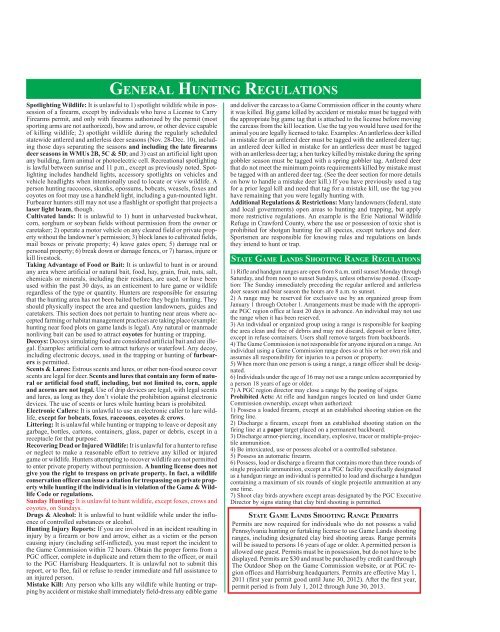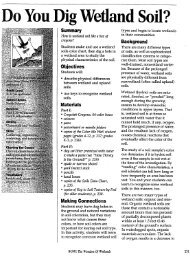Digest of Hunting and Trapping Regulation - Pennsylvania Envirothon
Digest of Hunting and Trapping Regulation - Pennsylvania Envirothon
Digest of Hunting and Trapping Regulation - Pennsylvania Envirothon
You also want an ePaper? Increase the reach of your titles
YUMPU automatically turns print PDFs into web optimized ePapers that Google loves.
GENERAL HUNTING REGULATIONS<br />
Spotlighting Wildlife: It is unlawful to 1) spotlight wildlife while in possession<br />
<strong>of</strong> a firearm, except by individuals who have a License to Carry<br />
Firearms permit, <strong>and</strong> only with firearms authorized by the permit (most<br />
sporting arms are not authorized), bow <strong>and</strong> arrow, or other device capable<br />
<strong>of</strong> killing wildlife; 2) spotlight wildlife during the regularly scheduled<br />
statewide antlered <strong>and</strong> antlerless deer seasons (Nov. 28-Dec. 10), including<br />
those days separating the seasons <strong>and</strong> including the late firearms<br />
deer seasons in WMUs 2B, 5C & 5D; <strong>and</strong> 3) cast an artificial light upon<br />
any building, farm animal or photoelectric cell. Recreational spotlighting<br />
is lawful between sunrise <strong>and</strong> 11 p.m., except as previously noted. Spotlighting<br />
includes h<strong>and</strong>held lights, accessory spotlights on vehicles <strong>and</strong><br />
vehicle headlights when intentionally used to locate or view wildlife. A<br />
person hunting raccoons, skunks, opossums, bobcats, weasels, foxes <strong>and</strong><br />
coyotes on foot may use a h<strong>and</strong>held light, including a gun-mounted light.<br />
Furbearer hunters still may not use a flashlight or spotlight that projects a<br />
laser light beam, though.<br />
Cultivated l<strong>and</strong>s: It is unlawful to 1) hunt in unharvested buckwheat,<br />
corn, sorghum or soybean fields without permission from the owner or<br />
caretaker; 2) operate a motor vehicle on any cleared field or private property<br />
without the l<strong>and</strong>owner’s permission; 3) block lanes to cultivated fields,<br />
mail boxes or private property; 4) leave gates open; 5) damage real or<br />
personal property; 6) break down or damage fences, or 7) harass, injure or<br />
kill livestock.<br />
Taking Advantage <strong>of</strong> Food or Bait: It is unlawful to hunt in or around<br />
any area where artificial or natural bait, food, hay, grain, fruit, nuts, salt,<br />
chemicals or minerals, including their residues, are used, or have been<br />
used within the past 30 days, as an enticement to lure game or wildlife<br />
regardless <strong>of</strong> the type or quantity. Hunters are responsible for ensuring<br />
that the hunting area has not been baited before they begin hunting. They<br />
should physically inspect the area <strong>and</strong> question l<strong>and</strong>owners, guides <strong>and</strong><br />
caretakers. This section does not pertain to hunting near areas where accepted<br />
farming or habitat management practices are taking place (example:<br />
hunting near food plots on game l<strong>and</strong>s is legal). Any natural or manmade<br />
nonliving bait can be used to attract coyotes for hunting or trapping.<br />
Decoys: Decoys simulating food are considered artificial bait <strong>and</strong> are illegal.<br />
Examples: artificial corn to attract turkeys or waterfowl. Any decoy,<br />
including electronic decoys, used in the trapping or hunting <strong>of</strong> furbearers<br />
is permitted.<br />
Scents & Lures: Estrous scents <strong>and</strong> lures, or other non-food source cover<br />
scents are legal for deer. Scents <strong>and</strong> lures that contain any form <strong>of</strong> natural<br />
or artificial food stuff, including, but not limited to, corn, apple<br />
<strong>and</strong> acorns are not legal. Use <strong>of</strong> drip devices are legal, with legal scents<br />
<strong>and</strong> lures, as long as they don’t violate the prohibition against electronic<br />
devices. The use <strong>of</strong> scents or lures while hunting bears is prohibited.<br />
Electronic Callers: It is unlawful to use an electronic caller to lure wildlife,<br />
except for bobcats, foxes, raccoons, coyotes & crows.<br />
Littering: It is unlawful while hunting or trapping to leave or deposit any<br />
garbage, bottles, cartons, containers, glass, paper or debris, except in a<br />
receptacle for that purpose.<br />
Recovering Dead or Injured Wildlife: It is unlawful for a hunter to refuse<br />
or neglect to make a reasonable effort to retrieve any killed or injured<br />
game or wildlife. Hunters attempting to recover wildlife are not permitted<br />
to enter private property without permission. A hunting license does not<br />
give you the right to trespass on private property. In fact, a wildlife<br />
conservation <strong>of</strong>ficer can issue a citation for trespassing on private property<br />
while hunting if the individual is in violation <strong>of</strong> the Game & Wildlife<br />
Code or regulations.<br />
Sunday <strong>Hunting</strong>: It is unlawful to hunt wildlife, except foxes, crows <strong>and</strong><br />
coyotes, on Sundays.<br />
Drugs & Alcohol: It is unlawful to hunt wildlife while under the influence<br />
<strong>of</strong> controlled substances or alcohol.<br />
<strong>Hunting</strong> Injury Reports: If you are involved in an incident resulting in<br />
injury by a firearm or bow <strong>and</strong> arrow, either as a victim or the person<br />
causing injury (including self-inflicted), you must report the incident to<br />
the Game Commission within 72 hours. Obtain the proper forms from a<br />
PGC <strong>of</strong>ficer, complete in duplicate <strong>and</strong> return them to the <strong>of</strong>ficer, or mail<br />
to the PGC Harrisburg Headquarters. It is unlawful not to submit this<br />
report, or to flee, fail or refuse to render immediate <strong>and</strong> full assistance to<br />
an injured person.<br />
Mistake Kill: Any person who kills any wildlife while hunting or trapping<br />
by accident or mistake shall immediately field-dress any edible game<br />
<strong>and</strong> deliver the carcass to a Game Commission <strong>of</strong>ficer in the county where<br />
it was killed. Big game killed by accident or mistake must be tagged with<br />
the appropriate big game tag that is attached to the license before moving<br />
the carcass from the kill location. Use the tag you would have used for the<br />
animal you are legally licensed to take. Examples: An antlerless deer killed<br />
in mistake for an antlered deer must be tagged with the antlered deer tag;<br />
an antlered deer killed in mistake for an antlerless deer must be tagged<br />
with an antlerless deer tag; a hen turkey killed by mistake during the spring<br />
gobbler season must be tagged with a spring gobbler tag. Antlered deer<br />
that do not meet the minimum points requirements killed by mistake must<br />
be tagged with an antlered deer tag. (See the deer section for more details<br />
on how to h<strong>and</strong>le a mistake deer kill.) If you have previously used a tag<br />
for a prior legal kill <strong>and</strong> need that tag for a mistake kill, use the tag you<br />
have remaining that you were legally hunting with.<br />
Additional <strong>Regulation</strong>s & Restrictions: Many l<strong>and</strong>owners (federal, state<br />
<strong>and</strong> local governments) open areas to hunting <strong>and</strong> trapping, but apply<br />
more restrictive regulations. An example is the Erie National Wildlife<br />
Refuge in Crawford County, where the use or possession <strong>of</strong> toxic shot is<br />
prohibited for shotgun hunting for all species, except turkeys <strong>and</strong> deer.<br />
Sportsmen are responsible for knowing rules <strong>and</strong> regulations on l<strong>and</strong>s<br />
they intend to hunt or trap.<br />
STATE GAME LANDS SHOOTING RANGE REGULATIONS<br />
1) Rifle <strong>and</strong> h<strong>and</strong>gun ranges are open from 8 a.m. until sunset Monday through<br />
Saturday, <strong>and</strong> from noon to sunset Sundays, unless otherwise posted. (Exception:<br />
The Sunday immediately preceding the regular antlered <strong>and</strong> antlerless<br />
deer season <strong>and</strong> bear season the hours are 8 a.m. to sunset.<br />
2) A range may be reserved for exclusive use by an organized group from<br />
January 1 through October 1. Arrangements must be made with the appropriate<br />
PGC region <strong>of</strong>fice at least 20 days in advance. An individual may not use<br />
the range when it has been reserved.<br />
3) An individual or organized group using a range is responsible for keeping<br />
the area clean <strong>and</strong> free <strong>of</strong> debris <strong>and</strong> may not discard, deposit or leave litter,<br />
except in refuse containers. Users shall remove targets from backboards.<br />
4) The Game Commission is not responsible for anyone injured on a range. An<br />
individual using a Game Commission range does so at his or her own risk <strong>and</strong><br />
assumes all responsibility for injuries to a person or property.<br />
5) When more than one person is using a range, a range <strong>of</strong>ficer shall be designated.<br />
6) Individuals under the age <strong>of</strong> 16 may not use a range unless accompanied by<br />
a person 18 years <strong>of</strong> age or older.<br />
7) A PGC region director may close a range by the posting <strong>of</strong> signs.<br />
Prohibited Acts: At rifle <strong>and</strong> h<strong>and</strong>gun ranges located on l<strong>and</strong> under Game<br />
Commission ownership, except when authorized:<br />
1) Possess a loaded firearm, except at an established shooting station on the<br />
firing line.<br />
2) Discharge a firearm, except from an established shooting station on the<br />
firing line at a paper target placed on a permanent backboard.<br />
3) Discharge armor-piercing, incendiary, explosive, tracer or multiple-projectile<br />
ammunition.<br />
4) Be intoxicated, use or possess alcohol or a controlled substance.<br />
5) Possess an automatic firearm.<br />
6) Possess, load or discharge a firearm that contains more than three rounds <strong>of</strong><br />
single projectile ammunition, except at a PGC facility specifically designated<br />
as a h<strong>and</strong>gun range an individual is permitted to load <strong>and</strong> discharge a h<strong>and</strong>gun<br />
containing a maximum <strong>of</strong> six rounds <strong>of</strong> single projectile ammunition at any<br />
one time.<br />
7) Shoot clay birds anywhere except areas designated by the PGC Executive<br />
Director by signs stating that clay bird shooting is permitted.<br />
STATE GAME LANDS SHOOTING RANGE PERMITS<br />
Permits are now required for individuals who do not possess a valid<br />
<strong>Pennsylvania</strong> hunting or furtaking license to use Game L<strong>and</strong>s shooting<br />
ranges, including designated clay bird shooting areas. Range permits<br />
will be issued to persons 16 years <strong>of</strong> age or older. A permitted person is<br />
allowed one guest. Permits must be in possession, but do not have to be<br />
displayed. Permits are $30 <strong>and</strong> must be purchased by credit card through<br />
The Outdoor Shop on the Game Commission website, or at PGC region<br />
<strong>of</strong>fices <strong>and</strong> Harrisburg headquarters. Permits are effective May 1,<br />
2011 (first year permit good until June 30, 2012). After the first year,<br />
permit period is from July 1, 2012 through June 30, 2013.



